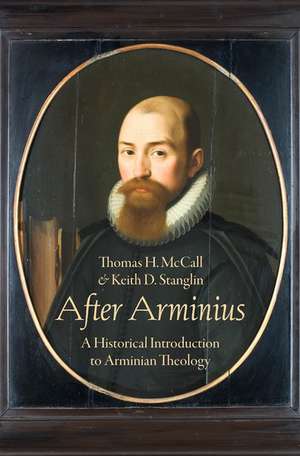After Arminius: A Historical Introduction to Arminian Theology
Autor Thomas H. McCall, Keith D. Stanglinen Limba Engleză Paperback – 5 ian 2021
Preț: 226.46 lei
Preț vechi: 240.66 lei
-6% Nou
Puncte Express: 340
Preț estimativ în valută:
43.33€ • 45.36$ • 36.07£
43.33€ • 45.36$ • 36.07£
Carte disponibilă
Livrare economică 27 februarie-05 martie
Preluare comenzi: 021 569.72.76
Specificații
ISBN-13: 9780190874209
ISBN-10: 0190874201
Pagini: 304
Dimensiuni: 155 x 231 x 23 mm
Greutate: 0.43 kg
Editura: Oxford University Press
Colecția OUP USA
Locul publicării:New York, United States
ISBN-10: 0190874201
Pagini: 304
Dimensiuni: 155 x 231 x 23 mm
Greutate: 0.43 kg
Editura: Oxford University Press
Colecția OUP USA
Locul publicării:New York, United States
Recenzii
Our authors have brought their considerable theological and historical gifts to bear on the production of the standard scholarly work on the historical development of Methodist theology and have provided readers with a fresh consideration of Remonstrant soteriology.
Until recently, scholarship has suffered from a dearth of historically contextualized, doctrinally nuanced studies of Arminianism. Richard Muller and others have developed sophisticated analyses of the Reformed tradition, which get behind blunt terms such as 'Calvinism' in order to highlight the variegated nature of Reformed theology. McCall and Stanglin have harnessed this approach and applied it to the Arminian tradition in a skilful and timely manner ... a valuable contribution
an introduction which aims to enable future scholarship ... well-made and illuminating.
Drs. Stanglin and McCall deserve highest commendations for this comprehensive and judicious overview. Addressing the compendium of this theological tradition requires superlative historical research that spans 400 years, as well as theological and philosophical insight into the vagaries and complexities of theological change. To be sure, secondary source citations are to be found here, but what strikes the reader is the degree to which these authors are acquainted with the original Latin and Dutch sources - giving nuance seldom found in such surveys. Stanglin and McCall have removed the excuse for scholars to resort to previously common theological caricatures of Arminius and his successors in all their theological expressions.
Stanglin and McCall have produced a worthy sequel to their Jacob Arminius: Theologian of Grace. In this important work they trace out the patterns of Arminian theology in the continental Remonstrant followers of Arminius and in British and North American Methodist Arminianism, depicting in a careful and compelling manner the rich history of Arminianism. The presentation of trajectories of Arminian thought in America from the eighteenth through the nineteenth century is of particular importance for the retrieval and reception of what has been a largely and unjustly neglected tradition in American theology. This is a fine work that sets a high standard for future writing in this field.
McCall and Stanglin have produced an impressive work, thoroughly researched, and well referenced, covering several centuries from the initial Remonstrant doctrines of Episcopius and, later, Limborch, through to Watson, Pope, Bowne and Miley, among others, who revised Arminian thought in the nineteenth century. Any student of Methodist history in need of instruction in Arminian theology would do well to place this book at the top of their reading list.
Until recently, scholarship has suffered from a dearth of historically contextualized, doctrinally nuanced studies of Arminianism. Richard Muller and others have developed sophisticated analyses of the Reformed tradition, which get behind blunt terms such as 'Calvinism' in order to highlight the variegated nature of Reformed theology. McCall and Stanglin have harnessed this approach and applied it to the Arminian tradition in a skilful and timely manner ... a valuable contribution
an introduction which aims to enable future scholarship ... well-made and illuminating.
Drs. Stanglin and McCall deserve highest commendations for this comprehensive and judicious overview. Addressing the compendium of this theological tradition requires superlative historical research that spans 400 years, as well as theological and philosophical insight into the vagaries and complexities of theological change. To be sure, secondary source citations are to be found here, but what strikes the reader is the degree to which these authors are acquainted with the original Latin and Dutch sources - giving nuance seldom found in such surveys. Stanglin and McCall have removed the excuse for scholars to resort to previously common theological caricatures of Arminius and his successors in all their theological expressions.
Stanglin and McCall have produced a worthy sequel to their Jacob Arminius: Theologian of Grace. In this important work they trace out the patterns of Arminian theology in the continental Remonstrant followers of Arminius and in British and North American Methodist Arminianism, depicting in a careful and compelling manner the rich history of Arminianism. The presentation of trajectories of Arminian thought in America from the eighteenth through the nineteenth century is of particular importance for the retrieval and reception of what has been a largely and unjustly neglected tradition in American theology. This is a fine work that sets a high standard for future writing in this field.
McCall and Stanglin have produced an impressive work, thoroughly researched, and well referenced, covering several centuries from the initial Remonstrant doctrines of Episcopius and, later, Limborch, through to Watson, Pope, Bowne and Miley, among others, who revised Arminian thought in the nineteenth century. Any student of Methodist history in need of instruction in Arminian theology would do well to place this book at the top of their reading list.
Notă biografică
Keith D. Stanglin is Professor of Historical Theology at Austin Graduate School of Theology. He is co-author of Jacob Arminius: Theologian of Grace. Thomas H. McCall is Professor of Theology and Scholar-in-Residence at Asbury University. He is co-author of Jacob Arminius: Theologian of Grace.
